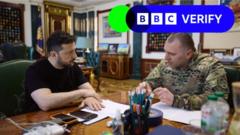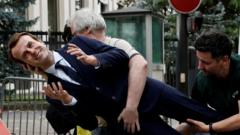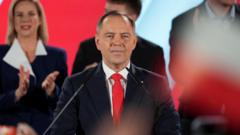In a meeting with UK Prime Minister Keir Starmer, President Trump reiterated his belief in Vladimir Putin's commitment to a potential peace agreement regarding Ukraine, juxtaposing Starmer's cautious approach to the ongoing conflict.
Trump Expresses Faith in Putin Amidst Ukraine Peace Talks with UK PM Starmer

Trump Expresses Faith in Putin Amidst Ukraine Peace Talks with UK PM Starmer
Trump's recent comments on peace in Ukraine highlight stark contrasts with British leadership.
President Donald Trump held a meeting with British Prime Minister Keir Starmer in Washington, during which he made significant remarks regarding the ongoing conflict in Ukraine. Sitting alongside Starmer in the Oval Office, Trump expressed his belief in Russian President Vladimir Putin's integrity, suggesting that he trusts Putin to adhere to any peace agreements that might be made to resolve the conflict.
"I think he’ll keep his word," Trump stated, indicating a long-standing familiarity with Putin. This perspective sharply contrasts with Starmer's approach, as he articulated a commitment to support Ukraine with British troop deployments for a post-war peacekeeping mission. Starmer urged Trump to reconsider any inclination to capitulate to Putin's demands.
When questioned about whether the U.S. would assist Britain should they opt to send peacekeeping troops to Ukraine and Russia were to violate a peace agreement, Trump’s responses fluctuated. Initially wavering, he ultimately implied that such assistance might not be necessary, saying, “They don’t need help."
In a broader context, Trump also discussed economic measures, announcing that tariffs on Canada and Mexico would commence on March 4, attributing them to the countries' insufficient efforts to curb drug trafficking into the United States. Furthermore, he mentioned that China would encounter an additional 10 percent tariff imminently.
The conversation highlights ongoing debates regarding Trump's stance toward Europe, as many in the European Union express concerns over the changing dynamics of the U.S.-European alliance. This situation echoes conversations in Washington about possible military intervention against Mexican drug cartels, raising concerns about U.S. foreign policy and its implications domestically and internationally.
"I think he’ll keep his word," Trump stated, indicating a long-standing familiarity with Putin. This perspective sharply contrasts with Starmer's approach, as he articulated a commitment to support Ukraine with British troop deployments for a post-war peacekeeping mission. Starmer urged Trump to reconsider any inclination to capitulate to Putin's demands.
When questioned about whether the U.S. would assist Britain should they opt to send peacekeeping troops to Ukraine and Russia were to violate a peace agreement, Trump’s responses fluctuated. Initially wavering, he ultimately implied that such assistance might not be necessary, saying, “They don’t need help."
In a broader context, Trump also discussed economic measures, announcing that tariffs on Canada and Mexico would commence on March 4, attributing them to the countries' insufficient efforts to curb drug trafficking into the United States. Furthermore, he mentioned that China would encounter an additional 10 percent tariff imminently.
The conversation highlights ongoing debates regarding Trump's stance toward Europe, as many in the European Union express concerns over the changing dynamics of the U.S.-European alliance. This situation echoes conversations in Washington about possible military intervention against Mexican drug cartels, raising concerns about U.S. foreign policy and its implications domestically and internationally.



















